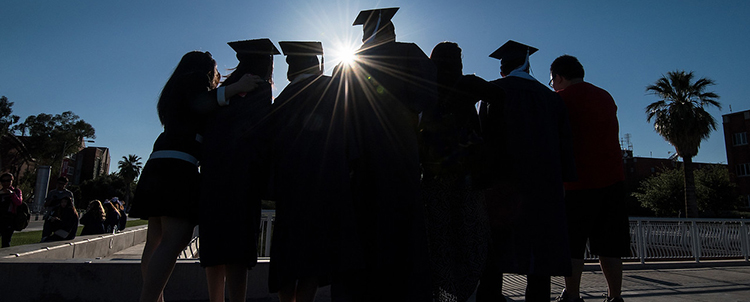
New ABOR College Completion Report: More degrees awarded in 2020, Arizona continues to lag nation in educational attainment
Arizona’s public universities produced more degrees in 2020 than at any other time in the state’s history. In fiscal year 2020, Arizona public university graduates earned 47,531 total degrees, a 29 percent increase over the last five years.
Detailed in the new Arizona Board of Regents Fiscal Year 2020 College Completion Report are degree trends, documenting the contribution of the universities in producing degrees needed to drive a competitive workforce for Arizona.
“It is good to see the number of degrees increasing at our universities, but we have more work to do to meet workforce demands of the New Economy,” said ABOR Chair Larry E. Penley. “As the pandemic has left many Arizona students and families with financial challenges, it’s important to enact change that provides more access for students. Through the board’s New Economy Initiative, Arizona can raise its competitiveness by increasing educational attainment, leading to increased prosperity for individuals and Arizona.”
Arizona’s public universities are Arizona’s largest provider of higher education, enrolling 204,460 students in fall 2020, of which 51.9 percent are Arizona resident students.
Although students at Arizona’s public universities earned a record numbers of degrees, Arizona continues to lag the national average in the number of residents with a bachelor’s degree. According to the most recent census numbers, 29 percent of Arizona’s population has a bachelor’s degree or more while the national average is 35 percent.
In response to this challenge, the board has outlined a promise to the state to “increase postsecondary access and attainment for Arizona students; to seek solutions to societal challenges; and to do both while increasing quality, affordability and efficiency.” Increasing educational attainment is crucial for Arizona as the population ages and jobs increasingly demand education past high school.
Among Arizona high school graduates who sought a four-year degree, 70 percent attend either Arizona State University, Northern Arizona University or the University of Arizona. Most of the universities’ graduates stay in Arizona, find jobs and contribute to the state’s workforce. In fiscal year 2020, the universities awarded 21,425 bachelor’s degrees to Arizona resident students, a 2.7 percent increase from fiscal year 2019.
The number of bachelor’s degrees awarded to historically underrepresented populations continues to increase year-over-year. In fiscal year 2020, Arizona’s public universities awarded 9,463 bachelor’s degrees, an increase of 7.3 percent from fiscal year 2019. All three of the universities significantly increased bachelor’s degrees in key STEM fields – together producing 9,295 bachelor’s degrees in 2020, a 61.7 percent increase over the last five years. The universities awarded substantially more bachelor’s degrees in health fields in 2020 – conferring 2,879 degrees, a 46.6 percent increase over the last five years.
“This report reflects the tremendous work from our presidents and all university employees. Their talent and dedication has increased degrees in key areas such as science, technology, engineering and health care and has dramatically increased outcomes for traditionally underrepresented students. For these efforts the board is deeply appreciative,” said ABOR Executive Director John Arnold.
Contact:
Sarah Harper, 602-229-2542, 602-402-1341 | Sarah.K.Harper@azregents.edu
 Back to Listing
Back to Listing